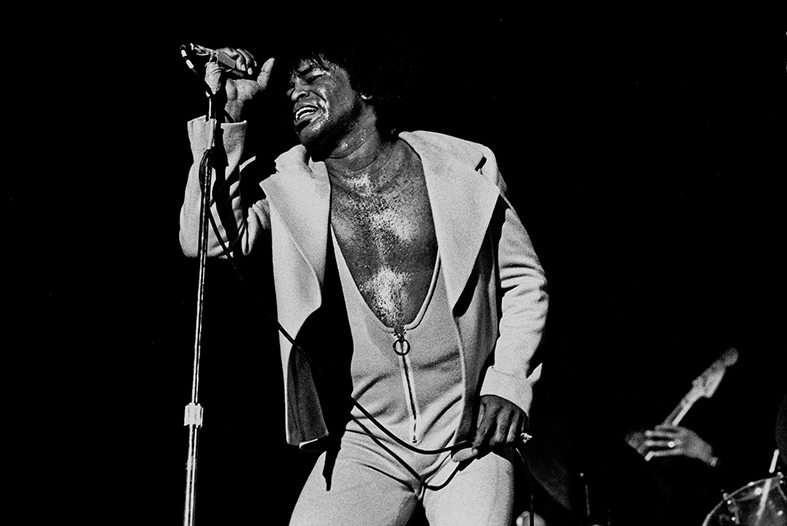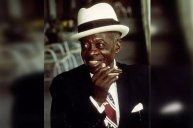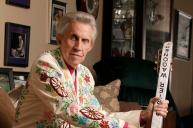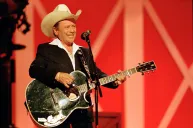On March 10, 1979, James Brown brought a little funk to the Grand Ole Opry stage to the dismay of staunch country music traditionalists.
Bringing Soul To The Opry
James Brown was originally asked by country star Porter Wagoner if he would consider playing the iconic Nashville stage. Brown, known as the Hardest Working Man in Show Business, said he would come as soon as he was invited. Wagoner discussed the possibility with manager Bud Wendell and announcer Hal Durham with the selling point that the Grand Ole Opry would get a popularity boost.
"I think we could get worldwide attention, and once in a while, that's helpful. Even if it's Coca-Cola, or even if it's the Grand Ole Opry. It's like Old Man River, you can keep rolling along but it's nice to have a shot in the arm once in a while to make something exciting happen," the Fayfare Opry Blog quotes Wagoner as saying.
Controversy Brewed
While Wagoner could see how Brown would fit into the grand scheme of the Opry stage, many others couldn't. A few days before Brown's performance date, the Memphis Press-Scimitar published the front-page headline, "Invitation to Soul Singer James Brown Brings Disharmony to Grand Ole Opry."
Though James Brown's soulful funk sound wasn't the norm for the 7 p.m. Saturday night Grand Ole Opry show, it didn't mark the first time a non-country singer took the stage. As Wagoner said, "The Grand Ole Opry is made up of entertainment, not necessarily marvelous singers but entertainers. That's what the show is built on, and it has some comedy, it has some singing."
But several Opry stars were vocal about the break-in what they thought the Grand Ole Opry lineup should be and they boycotted the show. Jean Shepard said, "It's a slap in the face to those people who drive thousands of miles to see the Opry and have to be subjected to James Brown. If Mr. Brown's on the first show, I'll appear on the second. If he's on both, I won't appear at all." Roy Acuff added, "I wish I could go out there and speak my mind, but I won't."
"I could throw up. The next thing you know, they'll be doing the strip out there," piano player Del Wood said. Wood and Justin Tubb, who also spoke out against Brown's appearance, attempted to make it clear that their disapproval wasn't related to race. "If it was Ray Charles, I'd be waiting to hug him when he came off the stage," Tubb said.
The Historic Performance
Rolling Stone writes that Brown followed the only Opry musician who openly supported his appearance at the time, Skeeter Davis. Brown took to the stage and played iconic country songs like "Your Cheatin' Heart, "Georgia," "Tennessee Waltz," and finally, his own hit, "Papa's Got a Brand New Bag," complete with the splits and microphone tosses.
Rock historian Ed Salomon who attended the event told Community Voices that James Brown received applause up until "Papa's Got a Brand New Bag" where he was booed for making changes to the band and rocking out too hard. "The audience reacted positively to Brown's first songs. It was only when he augmented the band with additional musicians and began 'Papa's Got a Brand New Bag' that he got booed. Some reporters tried to make that a racial comment but it was not; it was only in response to inappropriate material," Salomon wrote.
People complained that Brown went over his 30-minute set time, but Wagoner reported that he only actually played for only 17 minutes. Marty Robbins played for 45 minutes later in the night to no complaints.
Read More: Country Stars Who Were Banned from the Grand Ole Opry
In The Wake Of The Mic Drop
Though the level of outrage surrounding Brown's performance might be surprising, the Grand Ole Opry audience and musicians have a history of getting upset when a performer doesn't fit expectations. But the outrage isn't always consistent - an opera singer was booed as she was introduced in the 1950s, yet Paul McCartney and Perry Como were well-received. And just six months after Brown's appearance, Stevie Wonder played to a warm crowd.
The drama surrounding his appearance didn't faze James Brown, who considered the night to be a high point in his career. As a lover of country music, he was honored to play the stage and met happy fans backstage following his set. "I always have loved country music ever since I was a kid and listened to the radio in Augusta," Rolling Stone quotes Brown as saying. "Country music really is just the white man's blues."
This article was originally published in March of 2018.




